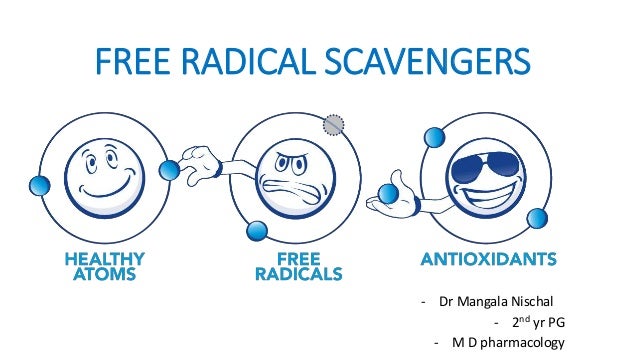checkout previous post about Free Radical
Part 1 - Free Radical
Part 2 - Danger
Part 3 - Molecule

Free Radical - Antioxidant Vs Free Radical
Antioxidants and free radicals
Antioxidants keep free radicals in check. Antioxidants are molecules in cells that prevent free radicals from taking electrons and causing damage. Antioxidants are able to give an electron to a free radical without becoming destabilized themselves, thus stopping the free radical chain reaction.
"Antioxidants are natural substances whose job is to clean up free radicals. Just like fiber cleans up waste products in the intestines, antioxidants clean up the free radical waste in the cells," said Wright.
Well-known antioxidants include
- beta-carotene and other carotenoids,
- lutein, resveratrol,
- vitamin C,
- vitamin E,
- lycopene and other phytonutrients.
Our body produces some antioxidants on its own, but an insufficient amount. Oxidative stress occurs when there is an imbalance of free radicals and antioxidants (too many free radicals and too few antioxidants), according to the Pharmacognosy Review.
Antioxidants can be acquired through diet.
"Antioxidants are plentiful in fruits and vegetables, especially colorful fruits and vegetables," said Wright. "Some examples include berries, tomatoes, broccoli, spinach, nuts and green tea."
Antioxidants became well known in the 1990s when scientists began to realize the possible effects of free radicals on cancer development, atherosclerosis and other chronic conditions. During the subsequent decades, scientists have conducted many studies on the effects of antioxidants with mixed results. Wright gave a few examples. "A six-year trial, the Age-Related Eye Disease Study (AREDS), found that a combination of vitamin C, vitamin E, beta-carotene and zinc offered some protection against the development of advanced age-related macular degeneration," she said.
On the other hand, Wright mentioned that a beta-carotene trial among Finnish men who were heavy smokers found an increase in lung cancer among those taking beta-carotene supplements.
Scientists do not completely understand the mixed results from the trials or the exact mechanism that makes antioxidants effective or ineffective against free radicals, but according to Wright, the study results suggest that it is more effective and potentially safer to get antioxidants through whole foods rather than supplements.
How Antioxidants May Prevent Against Free Radical Damage
The vitamins C and E, are thought to protect the body against the destructive effects of free radicals. Antioxidants neutralize free radicals by donating one of their own electrons, ending the electron-"stealing" reaction. The antioxidant nutrients themselves don?t become free radicals by donating an electron because they are stable in either form. They act as scavengers, helping to prevent cell and tissue damage that could lead to cellular damage and disease.
- Vitamin E - The most abundant fat-soluble antioxidant in the body. One of the most efficient chain-breaking antioxidants available. Primary defender against oxidation. Primary defender against lipid peroxidation (creation of unstable molecules containing more oxygen than is usual).
- Vitamin C - The most abundant water-soluble antioxidant in the body. Acts primarily in cellular fluid. Of particular note in combating free-radical formation caused by pollution and cigarette smoke. Also helps return vitamin E to its active form.
Love,
Ladybie
Most of the time our body need some energy to do our all work perfectly. And for this, we also need some best antioxidants and liposomal glutathione is the best antioxidant for our body. It helps to find all the free radicals from our bodies and destroy all these radicals. Also, this glutathione protect our different kinds of body organs like liver, kidney, and pancreas from different diseases.
ReplyDelete